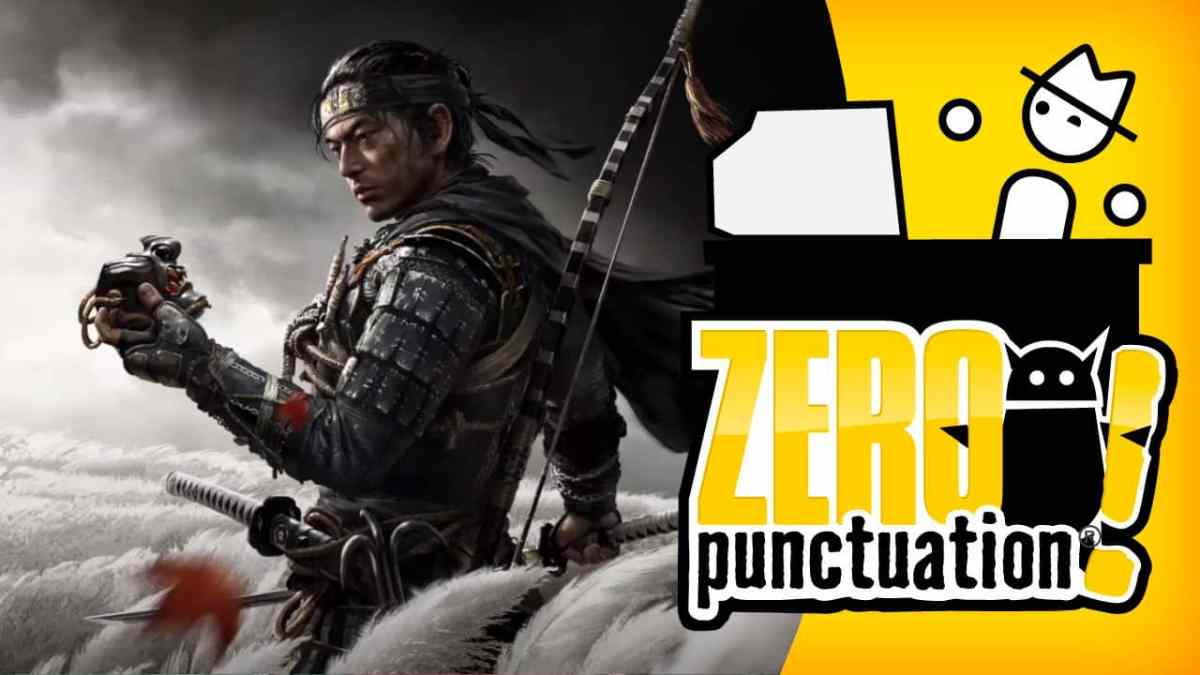This week on Zero Punctuation, Yahtzee reviews Ghost of Tsushima.
Want to watch Zero Punctuation ad-free? Sign-up for The Escapist + today and support your favorite content creators!
We have a new merch store as well! Visit the store for brand new ZP merch.
Transcript
It’s official: you’re getting too old if you can remember any of the following: Jerry O’Connell, pop music where they don’t sing like they just banged their foot on a coffee table, and tentpole games by Western triple-A developers being capable of more than one genre. I’m so fucking sick of open world stealth action games with crafting and collectibles.
Remember when Far Cry was a shooter, Tomb Raider was a precision platformer, and God of War was a high octane hack and slash? All of them have now been pulled into open world stealth action with crafting and collectibles like paper boats to an open sewer. I’m so fucking bored of squatting in a bush like a hiker who didn’t go before he left. Of having to nose around every shelf and drawer hoovering up crafting materials so I might one day make a new man purse that can hold more than four paperclips. So if you’re waiting for the next electrifying sea change in triple A games, Ghost of Tsushima ain’t it, mate, it’s the same shit with new wallpaper. Nice wallpaper, granted. None of your default Sims house rubbish, this is the classy stuff you put behind a respected historian in a documentary about the Renaissance. But wallpaper nonetheless. Felt like I should put that up front.
Along with this: the standard crafting resource in this game is “Supplies.” And every time I saw that word while on shelf safari I’m ashamed to admit I kept thinking about a very racist joke I once heard about a Chinese person at a birthday party. But anyway. Ghost of Tsushima is the story of Jin Sakai, a samurai in medieval Japan who is the last survivor when every other samurai gets trounced by Mongol invaders because the samurai were bound by their deep-seated code of honor and chivalrous combat and the Mongols just, you know, wanted to win.
Jin is rescued by a peasant thief who teaches him about mind-blowing new concepts like hiding, sneaking up on people, and generally not being killed. From then on Sakai mounts a campaign of guerilla warfare against the occupying Mongols, during which he is constantly torn between two worlds – his former life of noble bushido and stiff unyielding principles and his new life of not being fucking useless. Ghost of Tsushima does offer an interesting take on open world stealth action with crafti – I’m sick of saying all that, I’m just gonna give it a nickname. G of Tsushi does offer an interesting take on Jiminy Cockthroat.
Normally how it works is that you start with stealthing and resort to open combat once you fuck that up, but Ghost of Tsushima almost tries to shame you for taking the stealthy route. In fact, the game flat out prompts you to march right up to the front door like a Karen wielding an expired coupon and take out the first couple of lads in a little duelling minigame before getting stuck into the rest. Not that there are any actual gameplay consequences for opting instead to sneak around the bushes building a new sprinkler system out of slit throats. At most it’s implied that you’ll earn the disapproval of grumpy uncle dad and you do that anyway from actions the story campaign railroads you into.
After all, letting the player do things THEIR way is the watchword of Jiminy Cockthroat. I mean, giving us any kind of obligation or, like, establishing the theme through the gameplay mechanics smacks a little too much of actually having to design a game rather than resort to the same fucking templates as always. I mean, how can anyone possibly get bored of blocking light attacks and dodging heavy attacks. It’s a useful metaphor for so many things. Like dieting and conversation and correct umbrella usage.
Which might as well bring us to the combat. At first, I found it annoying. My kingdom for a fucking lockon button, especially in big open fights with multiple targets, and especially especially when the camera doesn’t seem quite sure how to act when we back into walls and furniture, and half the time opts to give you a moment to really appreciate the intricate texturework as axe-wielding Mongols turn you into a flesh slinky. But the combat felt a lot better some ways into the game after you unlock a few different stances, as it turns out that certain stances are very specifically intended for use against certain enemies and if you’re using the wrong stance you might as well be dusting off their health bar with a pastry brush.
So the combat is better once you’ve unlocked the things that make it work, almost like they should’ve been unlocked from the start, but no! Everything has to be unlocked through one of the nine different upgrade systems because that’s what the template says to do and we outsourced all our independent thought to eastern Europe. Alright, Larry, start the clock. Ghost of Tsushima is a very beautiful game, contrasting an environment full of stark cinematic colours against an atmosphere of serenity and emotional coldness to striking effect – babbling Mongol hordes trying to split you up like a Terry’s chocolate orange notwithstanding.
And the plot, while showing a lot of the usual sandbox game bloat full of inevitable lulls in the pacing because we spent half an hour grinding iron pickups to craft a new twat hinge, is paid off at the end with a rather hauntingly good final boss fight in which all the game’s themes and conflicts are paid off in a single duel between two central characters who have absolutely no desire to kill each other but have reached a final impasse by an untenable difference in philosophy, and it’s tragic and intense and moving and then of course they completely fuck it up by forcing you to meaninglessly pick one of two options from the Endingtron 3000 to get a very slight variance in the last few seconds of the game.
Yes, alright Larry, I suppose I couldn’t do thirty seconds of uncomplicated praise, here’s your twenty quid. All the cherry picked good bits in the world can’t separate Ghost of Tsushima from the usual issues of committee-driven big money development. Yes, there’s some great Kurosawa-esque boss fights but there’s also an optional grainy black and white video filter named Kurosawa Mode which is the sort of idea that probably sounded cool to a committee room full of Danish pastry fueled sub-producers, but in practise comes across a mite flippant.
The bottom line is that all of Ghost of Tsushima’s good qualities lie in the superficials. The visuals, the soundtrack, even the plot, all the stuff that eventually gets mentally shoved aside when you end up going down the usual neverending checklist of copy pasted collectibles and sub-objectives, picking one icon off the map after another like you’re using tweezers to clean rabbit turds off the rug. It really illustrates why games like Doom 2016 that have some kind of unique identity based around refined game mechanics are such rare gems in today’s Western triple-A market. If Ghost of Tsushima had been named Assassin’s Creed Samurai I wouldn’t have questioned it for an instant and that’s not good.
Why don’t you try to fix this the way you fix hoarding. Take all these templates and algorithms and standard practices that make up the Jiminy Cockthroat model, go through each one and if you can’t say how it specifically improves the gameplay, chuck it in the bin. What’s this one, flower collecting? Oh yes, you collect flowers to give to the merchant to craft clothing dye so you can make your armour red instead of black in the brief moment before it’s completely obscured by mud and gore effects and that’s going in the bin, isn’t i – it’s going in the bin, yes.






Published: Aug 5, 2020 12:00 pm